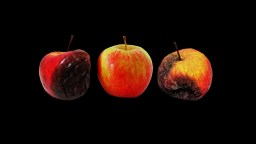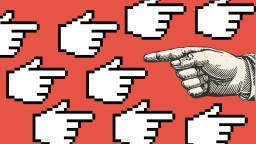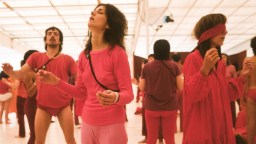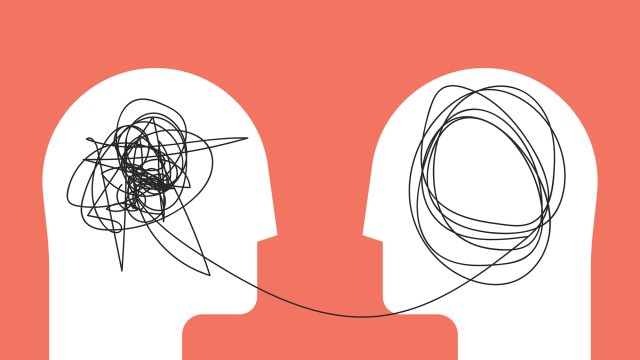3 highlights from Penn Jillette’s Big Think interview on 2020, cancel culture, and friendship
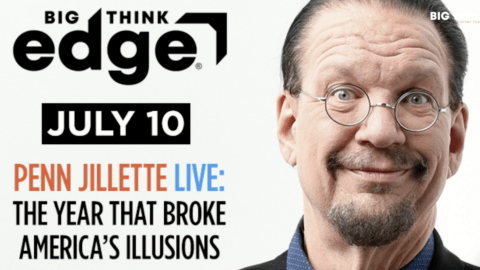
Big Think+
- Penn Jillette is an American magician best known for his work as part of the magic duo Penn and Teller.
- Jillette has also written eight books, co-hosted the Showtime show “Bullshit,” and produced the film “Tim’s Vermeer.”
- In the interview, Jillette talks about how libertarianism has been distorted in the U.S., and why the democratization of media hasn’t produced a utopia.
Over the past half-century, Penn Jillette and his collaborator Teller have become one of the most respected and recognizable magic acts in the world. But outside of magic, the 65-year-old has been, in his own boisterously idiosyncratic way, an outspoken commentator on issues like atheism, libertarianism, and more recently, health and weight loss. Self-described “carnie trash,” Jillette’s commentary can be found in their Showtime show “Bullshit,” his eight books, a YouTube channel, and in dozens of TV appearances.
Add to that list a recent interview with Victoria Montgomery Brown, cofounder and CEO of Big Think. Brown and Jillette touch on a wide range of topics — from how he lost more than 100 pounds in four months, to cancel culture, the strange nature of friendship, the strangeness of 2020, and how his relationship with audiences is transforming in his later years. Here are several highlights from Brown and Jillette’s interview, which you can check out below.
Penn Jillette: The year that broke America’s illusions | Big Think+www.youtube.com
Jillette has been collaborating with the magician and filmmaker Teller for 44 years on their magic act, currently stationed out of Las Vegas. In all that time, Jillette says their friendship has been more businesslike than affectionate.
“There’s just some people you just want to be with and there’s that cuddly feeling,” Jillette said. “And there’s other people who your relationship would be identical if it were over email, totally intellectual.”
The pair’s relationship is decidedly the latter.
“Teller and I have never had any affection for one another,” Jillette said. “No desire to hug. We only shake hands when it’s part of a script. We don’t seek out each other’s company, but there’s no one that I respect more and I believe at a core level that I do better stuff with Teller than I do alone.”
But that’s not to say that relationships like these are entirely about business.
“It turns out respect is more enduring than love,” he said. “Now, I have to add here that my daughter whenever I say this gets very, very bothered because she says that Teller is my BFF and there’s no way around that and that’s absolutely true. I’m saying that in a kind of skeletal way. The truth is that Teller’s my best friend over all those years.”
Jillette’s description of this type of relationship sounds a bit like Aristotle’s idea of the “friendship of the good.”
The Greek philosopher outlined three types of friendship, each based on a different feeling or value: pleasure, utility, and “good.” Aristotle thought the “friendship of the good” was the best kind of relationship, because it’s built on the respect and admiration for the virtues each friend sees in the other. Aristotle believed these friendships might not form quickly, but they tend to be longer lasting than the other types.
Libertarianism is “the belief that peace, prosperity and social harmony are fostered by as much liberty as possible and as little government as necessary” according to the Institute for Human Studies at George Mason University. But when this impulse toward individual freedom becomes too rigid, it can pose problems for a society that needs to work together to navigate a nationwide problem, like a pandemic.
Since COVID-19 began spreading across the U.S., there’s been a portion of Americans who say it’s un-American for the government to try to force (or, more accurately in most cases, ask) citizens to wear masks in public. Here, Jillette distinguishes between positive and negative freedoms, most commonly defined as freedom to and freedom from.
“Libertarianism has been so distorted,” Jillette said. “I mean I don’t know if I have to pull my name out of that ring. It’s been adopted by people who don’t seem to hold the responsibility side of it and don’t seem to hold the compassion side of it.”
“I can see arguments for not wearing seatbelts and I can see arguments for not wearing motorcycle helmets but I cannot see any argument for driving drunk. And that is what not wearing a mask is. It’s not risking yourself. It’s risking the people around you which I don’t see a way that that’s your right.”
How did the democratization and decentralization of the media change the world? In the 1990s, Jillette might have said that removing media gatekeepers would produce a sort of open, meritocratic utopia: you have an interesting idea, you throw it online, and it spreads all over the world.
But that’s not quite what happened.
“I thought getting rid of the gatekeepers could be nothing but good,” Jillette said. “And now it seems like getting rid of the gatekeepers gave us Trump as president and in the same breath, in the same wind, gave us not wearing masks and maybe gave us a huge unpleasant amount of overt racism.”
It also gave us cancel culture. But Jillette said he “can’t even rant against cancel culture,” because there’s no obvious way to fix it without obstructing free speech rights. After all, it’s a good thing that victimized people are now able to go online, post grievances, and (sometimes) see justice delivered, whereas in the past they had to file their complaints with a series of gatekeepers. But simultaneously, this unmanaged system leaves it vulnerable for abuse.
“Now you could be obviously lying and still have a million-and-a-half people believe you and do real damage to the person that you said wrong to,” Jillette said.


